
For the past decade, I've been researching the psychology of climate denial, exploring ways to counter misinformation about climate change. I came out of my PhD with inoculation as a powerful solution. After completing my PhD, I explored critical thinking as a tool to help develop inoculating messages.
One of the most intriguing leads from my critical thinking work was the potential of parallel arguments. This involves taking the flawed reasoning in misinformation and transplanting it into an absurd situation, making the logical fallacy more obvious. A lightbulb moment for me was realizing that this technique was used every night by late night comedians to debunk the misinformation of the day, in a way that was both entertaining and instructive.
Having worked as a cartoonist before my PhD, I immediately saw that cartoons were the perfect delivery mechanism for parallel arguments. So for the last two years, I've been experimentally testing parallel arguments as a means of countering misinformation on social media. Not only has this research shown that my funny is statistically significant (yes, that was the first thing I checked after data collection), we have also shown that parallel arguments in cartoon form are effective in neutralizing misinformation.

Despite progress made in these various lines of research, there remain several formidable social and psychological challenges to putting these scientific findings into practice:
In recent years, I have continued my research into inoculation while not knowing what to do about those unanswered challenges. A new branch of inoculation research, begun by Sander van der Linden, explored how a game where players interactively learnt the techniques of fake news could train people to detect the tell-tale red flags of fake news. Sander's game focused on teaching media literacy. I wondered whether his approach of "active inoculation" could also work against science denial.
I began designing a game that taught the techniques of denial. One powerful element of gamification is the capacity to use characters and narrative to engage and inform players. I created an archetypal "Cranky Uncle" character who mentored you in the techniques of denial—teaching you how to earn cranky points and eventually become a cranky uncle yourself. I also used cartoon parallel arguments to illustrate understanding of the logical fallacies.


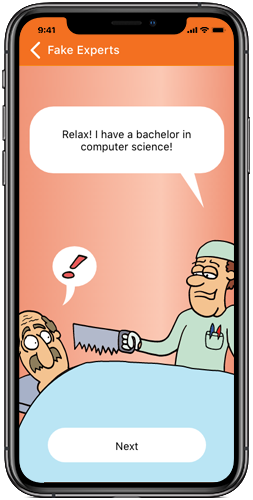
Whenever I mentioned the game to climate scientists, college professors, and high school teachers, I was (pleasantly) surprised at their strong interest in incorporating the game into their lessons. Without even trying, I had educators across the country interested in testing the game and assessing its effectiveness in increasing critical thinking skills.
This made me realize that gamification offered a potential solution to one of science denial's great problems: piercing through echo chambers. Given the hunger in educators for interactive resources that engage students, there was strong potential for a game that taught both climate science and critical thinking to be adopted in classes in red and blue counties all over the country. The seemingly insurmountable challenge of echo chambers suddenly seemed manageable.
I also incorporated quiz questions to get players practicing spotting different types of fallacies. I ran a series of quizzes via Twitter, receiving a great deal of feedback that helped me improve the design of my questions. I incorporated much of this advice in the game design:
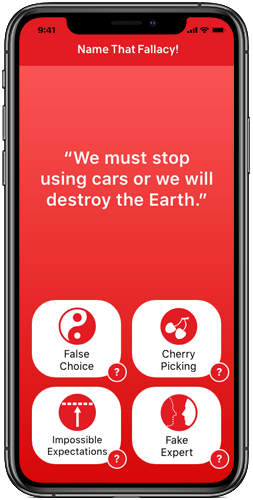
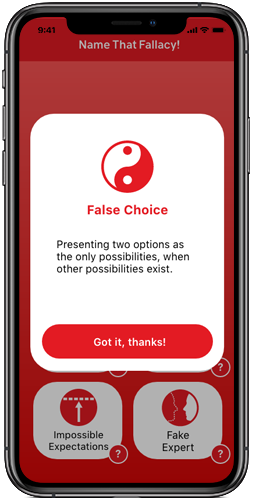
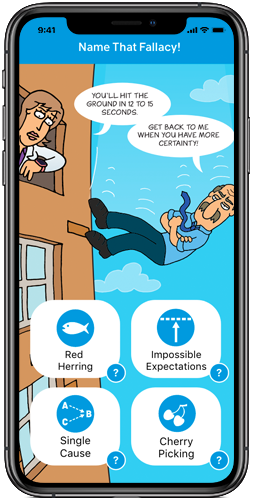
As I developed a large library of fallacy quiz questions, I began to realize that gamification offered a powerful opportunity for educators seeking to teach critical thinking. By using game features such as interactive quizzes, points and rewards systems, and player-to-player contests, players were motivated to continue practicing assessing arguments, spotting fallacies, and honing their critical thinking skills. Essentially, games can help turn a slow thinking task like argument assessment into a fast thinking reaction. Gamification has the potential to turn critical thinking into muscle memory.
I also began talking to Autonomy Coop, a group of marketers using their professional skills for social good. We began a collaboration testing parallel argument cartoons on Facebook (one of our experiments involved sending cartoons debunking the "cold weather disproves global warming" myth into conservative parts of the country about to get hit by a polar vortex cold spell). In our conversations, they opened my minds to the power of players competing against other players, or even more exciting, groups competing against other groups.
I began to imagine a critical thinking tournament, where classes in one school would compete against classes in other schools across the country. Regional contests draw on tribal instincts to motivate players to improve and compete. Imagine tribal instincts motivating students to hone their critical thinking skills, strengthening their resilience against misinformation. The chief driver of climate denial could be employed to help eradicate science denial!
So I began testing a prototype of the game in community colleges and universities. In collaboration with Jasper Fessmann from West Virginia University and David Kinkead from the University of Queensland, we developed a quiz that measured students' ability to detect 11 types of science denial techniques. We tested student's fallacy-detection skills before and after playing a prototype of the Cranky Uncle game. We found that critical thinking ability increased after just 30 minutes of game-play.
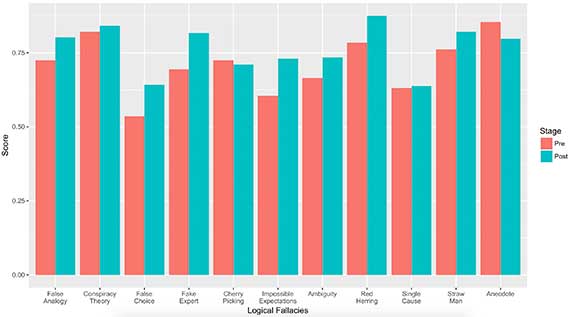
The most exciting thing about this research is that the quiz questions were non-climate-related. A game that explained logical fallacies in climate misinformation imparted resilience against other types of misinformation. Inoculation researchers call this the "umbrella of protection", and is one of the most powerful aspects of logic-based inoculation.
Also exciting was that the improvement in critical thinking came from a simple prototype that only simulated the game—it wasn't a properly programmed native app. That is the next step in this project. In order to fund development of the game, I will be launching a crowd-funding campaign early next week. You can sign up to be notified of when we launch at crankyuncle.com.
I've only been involved in crowd-funding once before. In 2013, we crowdfunded the journal fee required to publish our paper on the scientific consensus on climate change. We were surprised and delighted that it only took 9 hours to raise the $1,600 journal fee. The only disappointment was that given our international readership, some people woke up to find we'd already raised the funds and never got to contribute to what turned out to be a historic paper. We thought the consensus study might be significant at the time but never dreamed it would attract attention from world leaders such as President Obama and U.K. Prime Minister David Cameron, and be downloaded over one million times (actually now up to 1,106,341 downloads).
This time, rather than cap our crowdfunding amount, the more funds we raise, the more ambitious our game will become and the greater the societal impact. Here is a brief summary of our stretch goals depending on how successful our crowdfunding campaign is:
One more thing (for now). There is only one time limit with this crowd-funding campaign. We will be offering a number of rewards for donors (more on this later) but the top reward will be a cameo appearance in the game. In other words, I will draw a caricature of you into a parallel argument cartoon that will be used to illustrate a specific denialist technique. For example, I will draw one donor into this example of cherry picking:

However, I'm only offering this reward to the first 97 "Cameo" donors. Why 97? First, because if you haven't noticed yet, I have a bit of a thing for the number 97. Second, drawing 97 people is a lot of work! Drawing 97 climate scientists nearly killed me! So only the first 97 Cameo backers will get immortalized in the game. If you want to be one of the first to find out when the crowd-funding campaign launches, sign up at crankyuncle.com.
Posted by John Cook on Tuesday, 26 November, 2019
 |
The Skeptical Science website by Skeptical Science is licensed under a Creative Commons Attribution 3.0 Unported License. |